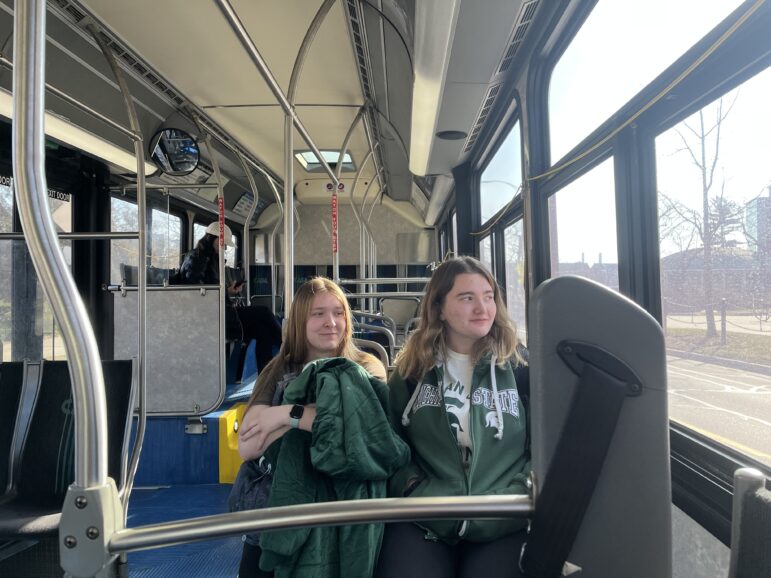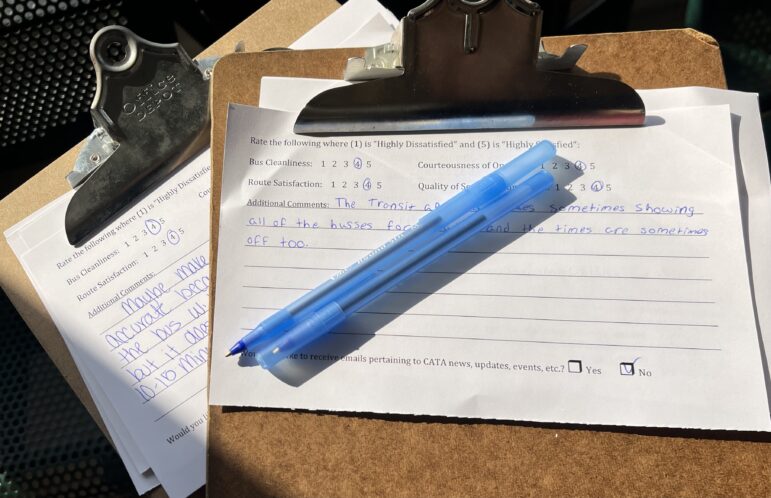
DeShawn Johnson
Two Michigan State University students riding a CATA bus during a Listening Bus session.The Capital Area Transportion Authority launched a feedback program in late January to improve rider experience. This program is known as The Listening Bus.
Waiting for and riding the bus, especially in the Michigan weather, can be emotionally and physically difficult.
Sometimes, the bus shows up extremely late because the CATA Transit app gave the wrong arrival time without timely updates.
This exact situation happened to Ava Ferguson, a freshman at Michigan State University, who just a week before was forced to walk to class in the rain and ended up being late, soaked and frustrated.
On the brighter side of things, Ferguson was given the chance to explain her frustration to CATA surveyors during one of the Listening Bus sessions on March 1.
“I’d say it’s very important to get students’ feedback just to improve things,” Ferguson said.
Ferguson and others who rode The Listening Bus explained that there can be some inconsistencies with CATA’s Transit app, but they were unsure how to relay that information before these sessions.
During these sessions, CATA employees ride along with everyday bus riders and simply ask them for their feedback. Riders will also be provided with a survey form to help CATA get a better understanding of their perspectives.

DeShawn Johnson
Two CATA feedback forms that were handed out during the March 1, Listening Bus session.Riders who want to participate in one of the Listening Bus sessions can also fill out a form online that will be given directly to CATA employees.
Lolo Robison, CATA director of marketing, customer experience and public information, said the Listening Bus gives everyday riders a voice.
“It’s important for us to design a service that meets the needs of our riders. We consider them the experts in terms of what works for them,” Robison said. “Of course we provide the service, but in order to be relevant and meet their riding needs, we need to listen and not dictate what works and what does not.”
So that is exactly what CATA employees have been doing on buses along busy routes, such as 31 and 32, which are popular with Michigan State University students, who rely on public transit to get to class or around the city and campus.
Popular routes being overcrowded was one of the main concerns expressed during the first trial run of the Listening Bus on Jan. 30.
A few adjustments have been made since that trial run, including expanding some of the Listening Bus sessions into the bus stations to get feedback from riders and drivers.
CATA bus driver Theresa Treanor explained that she wishes CATA had more sheltered areas for the students so they could avoid the weather. Treanor said it also a safety issue.
“I wish we had more shelters for them, and shelters that are lit. A lot of the time there’s a stop that has no lights around, and we might not see them, and it’s a safety issue for them,” Treanor said. “They could step out because they think we see them. Otherwise it’s a safety issue for people being predatory towards them.”
Riders said that they much preferred the in-person interaction of the Listening Bus, rather than trying to relay their issues online.
Katie Hu, an everyday CATA bus rider, said, “I prefer the in-person survey because they can actually understand my feelings rather than the website. I might be a little lazy and just skip an online survey.”
Many riders expressed the importance of being asked for feedback because they believe it is CATA’s job to transport them to their destinations “easily and safely.”
The Listening Bus has a published schedule for those who would like to plan when to meet with a Listening Bus representative. This schedule will continue to be updated, and the forum and format of the Listening Bus will be reevaluated as the sessions continue.